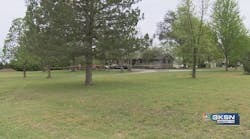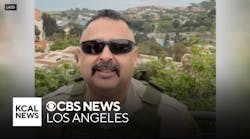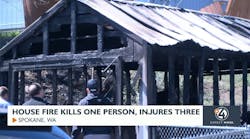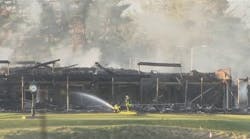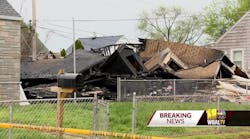Shackled and draped in a suit of body armor, Robert Butler emerged from the Schenectady Police Department last May for his short ride to jail.
Butler's protective outfit may have been because police didn't want to take any chances. They had accused him of setting a house fire that killed four people -- 32-year-old David Terry and his three children, Layah Terry, 3; Michael Terry, 2; and Donavan Duell, 11 months. Butler soon would face charges that could have led to the death penalty.
But authorities apparently had arrested the wrong man. And now no one is facing charges for the multiple homicide last May on Hulett Street.
In an extraordinary move, Butler was released from federal custody Feb. 7 after spending nine months in jail. The office of U.S. Attorney Richard S. Hartunian filed an order dropping the charges and issued a statement citing the "unusual and complex facts, including information regarding the involvement of others ..."
Federal authorities won't elaborate on what prompted their decision. "We don't comment on pending investigations," Hartunian said.
But a Times Union review of the case, including interviews with witnesses, attorneys, investigators and law enforcement officials, raises questions about whether Butler's arrest was the product of a hasty or misguided investigation in which police and federal agents disregarded leads about a second man who may have had a grudge against Terry.
The second man, Edward Leon of St. Johnsville, has not been identified by police as a suspect, nor has he been accused of having any role in the fatal fire. A person briefed on the case said Leon denied being near Schenectady at the time of the fire. Attempts to reach Leon for comment were not successful.
James Frolke, a "nearly retired" bus driver from Amsterdam, knows Leon well.
Frolke said he learned of Butler's arrest from a news broadcast a day after the May 2 fire. Frolke, who never met Butler, called Schenectady police that day to tell them they may have made a mistake, and that they should be investigating Leon.
"In my gut, I know they had the wrong guy," Frolke said. "It was days later when they called me back. I gave them all the information I had. ... They said, well, we have pretty good information that this (Butler) is the guy and they pretty much dismissed what I had to say."
A six-page complaint filed in federal court last June included damaging evidence against Butler, including statements from two people who were with Butler on the night of the fire and said he did it. Those witnesses included Jennica Duell, 25, who was Butler's girlfriend and the mother of the children killed in the fire.
The criminal complaint cited a series of disturbing text messages exchanged by people close to Butler and Terry. The texts referenced Butler's anger at Terry for kicking him out of the Hulett Street residence after Terry believed Butler mistreated Duell.
The federal complaint against Butler also noted a detective smelled gasoline on Butler when he was being questioned on the afternoon following the fire, though forensic testing found none on his clothing.
Terry had a complex relationship with Duell. His family said he had a big role in helping raise their children. The couple's other child, Sa'fyre, who is 5 years old, was critically burned in the blaze.
Butler's motive, according to the complaint, was that he wanted revenge against Terry, who witnesses said died trying to save the children from the fire.
A month after his arrest, Butler faced a potential death penalty when his case was referred to the Justice Department by Schenectady County District Attorney Robert Carney.
A federal grand jury has been reviewing evidence in the case for months, but a turning point may have come in December when Butler's federal public defender, Timothy E. Austin, laid out information for federal authorities that pointed away from Butler.
"Although we will not identify any other people as suspects, we can confirm that we conducted a painstakingly thorough investigation over several months," Butler's attorneys, Austin and William T. Easton, said in a statement provided to the Times Union on Saturday. "The evidence that we have uncovered over the last nine months demonstrates that Mr. Butler did not set this fire."
Much of the information came from Austin's investigator, Thomas Kubisch, a former Albany city detective who works for the federal public defender's office. Between June and December, Kubisch, who declined to be interviewed for this story, sifted leads on Leon, a lifelong resident of St. Johnsville who works for a carnival company.
Last summer, Kubisch visited Frolke, who noted that Schenectady detectives never came to his Montgomery County residence to interview him in person. Frolke said he recounted for Kubisch what he told the detectives: that his 31-year-old daughter, Brianne, had broken off a relationship with Leon last spring and struck up a new one with Terry, whom she had known since high school.
Brianne Frolke did not want to be interviewed for this story, her father said.
Leon, 41, was furious that Brianne Frolke had rekindled her relationship with Terry, according to James Frolke. He characterized his daughter's break-up with Leon as "tumultuous," adding that Leon allegedly sent his daughter unsettling text messages throughout their breakup. Leon was so obsessed with his daughter, Frolke added, that he had a tattoo resembling a wedding ring and including her initials emblazoned on his ring finger.
"He had come to live with Brianne in Amsterdam, and they had problems and he moved back to St. Johnsville and wanted to take her there, against our wishes," Frolke said.
After the breakup with Leon, Frolke said, his daughter's relationship with Terry blossomed. Frolke drove his daughter to Terry's residence on occasion so she could visit him, with her children, and they planned to marry last June, he said.
Looking back, Frolke said an incident last March involving his daughter and Leon troubled him.
On St. Patrick's Day, Leon visited Brianne Frolke and her children at the two-story residence they had once shared on New Street in St. Johnsville. A week earlier, Frolke said, his daughter had asked Leon to move out.
When Leon returned to the residence that day, it caught fire, according to a story in the Courier-Standard-Express newspaper. The story was published last May, the day before the Schenectady fatal fire, after a fundraiser to benefit Brianne Frolke and her children. In the article, Edward Leon recounted helping usher Brianne and her children to safety as the fast-moving fire engulfed the residence.
No one was hurt, and local fire investigators determined that it was started by an unknown electrical problem in the basement, according to Frolke.
On the day of the early morning fatal fire in Schenectady, Frolke said, Leon drove to his house in an older-model van looking for Brianne Frolke. "I wouldn't let him see her," Frolke said. "It was a light-colored van. I remember the back hood that opens up on the Caravan; it had a different-colored back door."
As part of his work, Kubisch was provided copies of videotapes from street-pole cameras in the area of the Hulett Street fire. The videos, owned by the city of Schenectady, were seized by the arson task force assigned to the case, including the federal ATF.
The street-pole cameras captured images of a light-colored van, similar to one owned by Leon, driving toward the scene of the fire around the time it started and then driving away, according to a law enforcement source and a person with knowledge of the case. However, a person briefed on the case said that when Leon was later interviewed by detectives, he denied being anywhere near Schenectady on the night of the fatal fire.
Still, the van captured by the street cameras was distinctive because it had a rear door that was a different color than the body of the vehicle.
Kubisch traced the van to a repair shop, where it was brought by Leon after an accident, and took photographs of it.
About three months ago, federal agents, following up on the lead, retrieved the van from a salvage yard to which it had been moved. FBI experts have analyzed whether it's the same van seen in the street-pole tapes, a law enforcement source said, but the results of that analysis are not public.
Other information that pointed away from Butler included a series of anonymous threatening text messages that were directed to Terry in late April, days before the fire was set, sources said. The phone used to send the messages was a TracFone owned by an anonymous person. Kubisch traced the purchase of the telephone to a pharmacy in Westchester County. Leon drove a delivery truck for a food-service company and his route covered the area near the pharmacy, according to multiple sources briefed on Kubisch's work.
People close to Terry who received texts from the anonymous phone included Brianne Frolke. The sender signed some of his messages as "The Undertaker," according to a person close to the case.
Kubisch went to the pharmacy at which the phone was purchased and interviewed a manager, who showed him records indicating that Leon had allegedly registered for a discount card at that pharmacy on the day the cellphone was purchased. The phone was used for about four or five days and discarded, according to a person briefed on the case.
Meanwhile, other potential weaknesses in the case against Butler were emerging.
On Jan. 31, Duell, who was with Butler in Saratoga Springs on the night the fire was set, returned to testify a second time before the federal grand jury reviewing the case, according to her attorney, Daniel Stewart. He declined to say why she went back or what she told the panel.
But in an interview with the Times Union last July, Duell said she lied in her statement to police indicating she was with Butler at the scene of the fire. Duell said she never left Saratoga Springs that night, where she and others in the house had done drugs.
"I was telling the cops whatever they wanted to hear so I could get home to Sa'fyre, even if that means I have to lie to be next to my daughter," she told the Times Union. She added that she took LSD that night and fell asleep just before 3 a.m. She said Butler woke her up at 9 a.m. and she has no idea if he left Saratoga Springs that night. Butler did not have a car.
It's unclear whether Duell's Jan. 31 testimony before the grand jury was a factor in the U.S. Attorney's decision to drop the case against Butler a week later. The dismissal of Butler's case came three days before they federal authorities faced a deadline to indict him or drop the charges.
There was another twist involving Duell's earlier statement implicating Butler. On the morning of the fire, Butler, Duell and a third man, 19-year-old Brian Fish, needed to borrow money to take a taxi from Saratoga Springs to Schenectady after they learned of the fire. Their emotional reaction to a news broadcast about the fire was captured on a convenience store video camera in Saratoga.
The taxi that drove them was equipped with a video-surveillance system, which reveals Duell talking on a cell phone and telling someone that an "ex-boyfriend" of Terry's girlfriend, Brianne Frolke, had recently threatened to kill him.
Detectives initially had a different scenario for the trip of the three. They claimed someone with a car picked up Butler, Duell and Fish and drove them to Schenectady from Saratoga Springs, stopping along the way to buy gasoline. But it's unclear if they ever found the car and authorities have not publicly identified that driver or said if they know who it is. Cellphones used by the group also showed no activity that night, according to their attorneys.
[email protected], 518-454-5547, @blyonswriter
Copyright 2014 - Times Union, Albany, N.Y.
